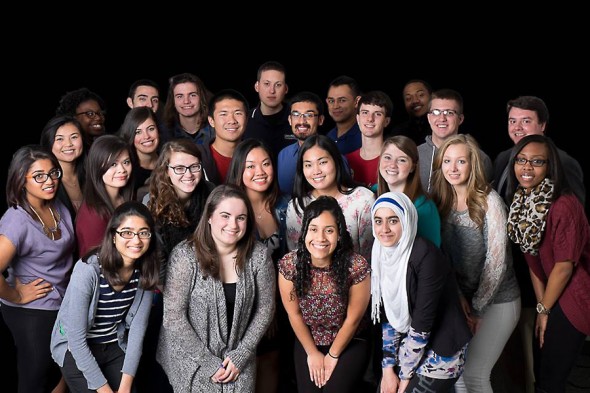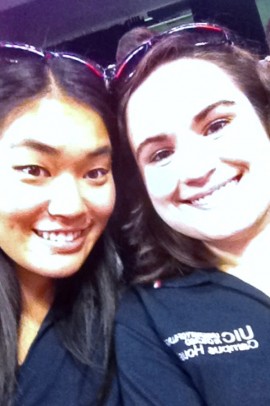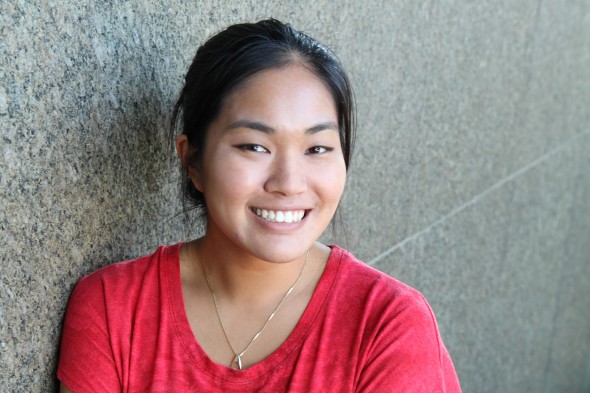Three reasons your PMs deserve more credit (too)
♪♫♪ Slow down, you’re doing fine, you can’t be everything you want to be before your time / Although it’s so romantic on the borderline tonight…
If someone had told me when I moved in to my Common West room just over two years ago that I would be a Peer Mentor for Campus Housing, I would never have believed it. I’ve always been more of a loner with a small, close circle of friends. While I wasn’t shy, I was often perceived as such by strangers because of my introversion and my reticence in large group settings. It was beyond my imagination to just picture myself in a staff environment where everyone works so closely together, let alone being responsible for over 60 residents that all live footsteps away from each other.
Flash forward two years to today, when I’m well into my second year as a PM for Campus Housing. As most of my friends are well aware, I am a returning PM in Courtyard residence hall. For commuters who are less familiar with the ins and outs of the UIC residence halls, Courtyard is one of the largest and oldest residence halls on campus, and it’s probably the most recognizable because it is so noticeably marked by a gated courtyard—hence its suitable name. Courtyard, like the rest of the res halls on East Campus (Commons West and Commons North/South) houses mostly freshmen and first-year students. For the staff of RAs and PMs, this means that there is never a boring moment because new students are always full of questions and eager to meet new people. In some ways, this makes our jobs easier because more enthusiastic residents means more interest in community building and programs—but in other ways, it’s also challenging because we have our hands full for the first couple months of school trying to make sure every person feels settled in and well-adjusted to UIC because for many of them, living in the residence halls is the first time they are really living away from home.
There’s a side of residence life that isn’t seen too much by the residents. They might not realize it, but there’s a lot of work, time, and heart put in by the staff to try to make sure they have the best experience possible living here. But unfortunately, it turns out that most residents (understandably) focus their attention instead on their WiFi connection problems, or the malfunctioning washing machine in the laundry room, or the same old meal choices in the cafeteria…
When I was surfing Facebook the other day, I noticed a particular article that was being shared online by several of my fellow coworkers—“3 Reasons Why Your College RAs Deserve More Credit Than They’re Given”—and I could immediately see why. The article touches upon why being an RA can be an underappreciated job by a lot of residents (until they’re locked out of their room, or require mediation with their roommate troubles, or need any other immediate assistance) and it explains why RAs should get more credit for being able to handle such a time costly job while balancing their own work as a student.
And that got me thinking about UIC Campus Housing especially—because as (hopefully) all first-year residents are aware, they not only have an RA for their floor, but also a PM specifically for academic purposes. The article mentions several reasons that RAs should be given more credit—they’re not out to write people up, they’re constantly exhausted, and there’s a lot expected of them—and these all happen to be true for PMs too. But still, I constantly hear the question (sadly sometimes even from my very own residents): what exactly does a PM do? Or in more blunt terms…why are you paid to live on campus and how do you help us?
The answer isn’t really simple and can’t be summed up in one sentence because, like RAs, PMs do a lot. And we’re also not always appreciated or recognized for what we do. To create some semblance of an answer to that question I always dread getting, and to parallel the terrific online article I saw on my newsfeed several times, I came up with three reasons that the Peer Mentors of UIC Campus Housing deserve more credit, too:
1. We’re helping you with what you came here for.
For first-year students, the allure of college comes in the form of some simple things: friends, independence, parties, a fresh start…but sometimes what gets lost in the transition is education. Which, in the end, is why we are all paying thousands and thousands of dollar each year to attend UIC. Everyone has a purpose here—a goal that they’re working toward. Whether that’s getting a degree, going on to graduate or professional school, or jumping straight into a career, everyone’s path is going to depend to some extent on getting the grades they need on their transcript. And that is exactly what Peer Mentors are here to help with: helping you succeed in academics so that you get what you need out of being here and eventually make that walk down the graduation stage.
2. We’re always your personal resource throughout the year.
During the first six weeks, everyone is eager—eager to meet new people, find out where to go for what on campus, and figure out who they’re going to be within the college social circle. But then some time passes…and then it’s the second semester. People have mostly cemented their friend circles. It’s clear how to submit work orders, how to do laundry, and where to get a loaner key if they’re locked out. When there are homework problems, they know where the tutoring centers are. By this time, everyone has mostly grown used to residential life and can skate by without going to programs to meet people or staying on the floor so much…but PMs are still needed. Peer Mentors not only tutor (which they do, on regular hours in the Learning Resource Centers on campus in the evenings), they also make sure residents are on track for graduation. Come spring semester, your social life might be good to go, but you’re still probably going to have questions about course registration, reading your DARS report, making appointments with your advisor…all things that PMs are there to assist you with throughout the year. A Peer Mentor’s job never really ceases throughout the entire year because your classes at UIC don’t stop and typically only get harder. PMs are here to make sure you’re still being successful academically come March when you’re stuck in the lull of second semester just waiting for summer.
3. We’re students, too.
Like RAs, PMs have a lot on their plate. Not only do they have their hands full with their own classes, but they’re also essentially responsible for the academic success of 60 or more first-year students who are usually taking classes that they either took several semesters ago or never even taken at all. When it comes to tutoring, PMs try to help with any kind of subject, and that requires a lot of retention and rapid refreshing of old classes or even quick learning of new subjects to somehow be helpful to the student trying to learn whatever it is they’re having trouble with. All of this tutoring is also balanced with making programs that must have an academic edge to it catered to the residents—and while they often are, these programs aren’t always about school either. Many programs center on critical skills and information that would be important for any college student to know, including staying safe in the city, alcohol awareness, healthy relationships, safe sex, and self-defense. Predictably some of these topics don’t garner as much interest from residents as would a social program for frozen yogurt—but they’re all incredibly valuable topics and PMs have the challenging job of making them appealing enough so that people will show up and hopefully gain something from doing so.
Of course, just like the reasons in the original article, those above reasons can apply for both RAs and PMs. But from my experience, it’s these things that don’t often go recognized or realized by residents, and sometimes I wish they did. A lot about the job can be tough, stressful, and even thankless at times…but that’s okay with me.
It’s okay because although this job occupies so much of my time, thought and energy, I can’t imagine where I would be today without it. Working in Campus Housing has brought more to me than a simple roof over my head, but if I were to pick one reason alone that keeps me always coming back to this job, it would be the people I’ve met through it. Through working together with such a diverse and talented staff of students of every major and background and meeting so many people and residents on campus, many of my closest friends at UIC have come from living and working on campus. No matter where I am on campus, whether it’s studying the library, walking across the quad, or eating in the cafeteria, there is never a dearth of familiar and friendly faces around me and I never have a chance to feel lonely. I’ve learned so much just by interacting with my friends, and I know that the memories I make with them are the experiences that I will remember—and that alone makes me want to always be a part of my staff and hall community.
You’re gonna kick off before you even get halfway through / Why don’t you realize Vienna waits for you? ♪♫♪
(Vienna – Billy Joel)
Sarah Lee is a junior studying neuroscience and Russian in the GPPA Medicine program at UIC. She’s still trying to figure out exactly what she wants to do, but some of life goals include running a marathon, exploring Eastern Europe and becoming fluent in Russian. In her free time, she loves running, playing piano and guitar, and reading. A Naperville native, Sarah is a peer mentor in the Courtyard residence hall.



